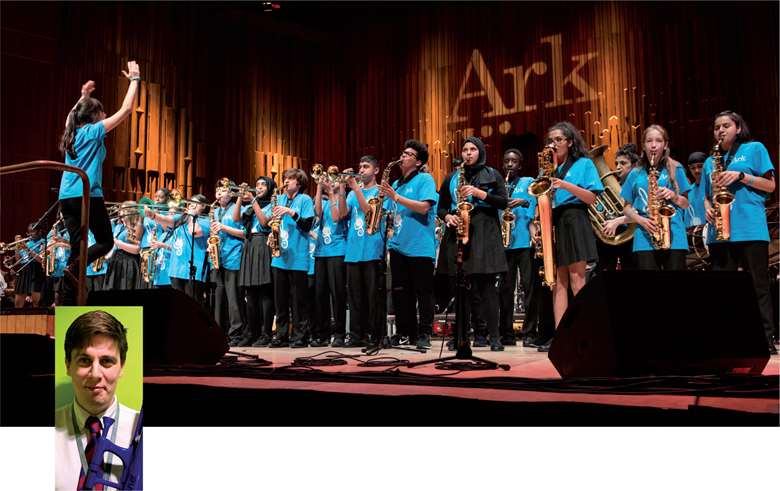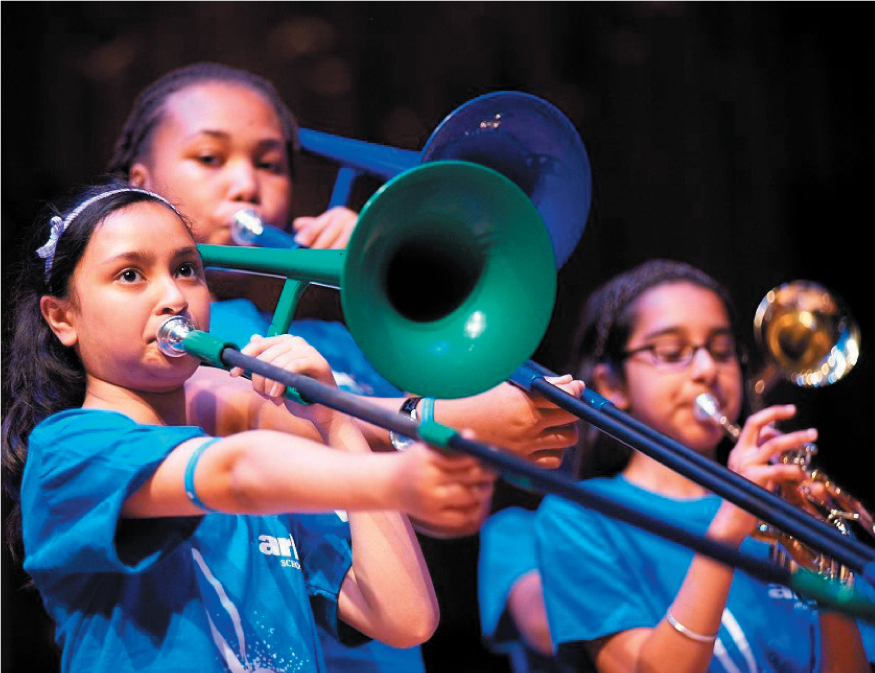Beyond the Big Band Project: Isaac Newton Academy
David Guinane
Thursday, July 1, 2021
What does an outstanding school music department look like? Greg Coughlin, director of music and Big Band at Isaac Newton Academy, speaks to David Guinane following his department's win at the Music & Drama Education Awards earlier this year

All images: Greg Coughlin
Isaac Newton Academy (INA) in Ilford opened its doors to 180 Year 7 students in 2012. The vast majority of students are from a South Asian ethnic heritage background, and many speak English as an additional language. From the outset, most students started secondary school with very little musical experience. Through targeted funds provided by the school's sponsor, Gerard Griffin, the ‘Big Band Project’ at INA provides each student with an instrument when they join the school. Director of music Greg Coughlin's innovative curriculum has been hugely successful, with 100 students taking GCSE Music, and many continuing to A Level. Results over the last four years have been outstanding, with almost all students passing, and 50 per cent of students achieving grades 7-9 in GCSE Music.
DG: Greg, congratulations on being crowned ‘Outstanding School Music Department’. How did it feel when it was announced?
GC: I was delighted. It felt like a moment of recognition for us as a team at INA. When the school began, we developed a vision for music education that we've been implementing and refining for nearly a decade. To have our vision for an inclusive music education recognised externally is really special to us.
DG: Let's dive into the set-up of your department. How is music delivered in your school?
GC: At Key Stage 3, students receive two hours of music education each week. One hour is very recognisable as a ‘music lesson’, while the other is a ‘Big Band’ lesson; a triple-staffed session in which students are divided into three groups (saxophones, brass, rhythm section) and taught by specialist teachers. All our teaching happens in-house, with no individual peripatetic lessons delivered in school. Students receive an instrument when they begin school in Year 7 (and currently, as the primary school develops, Year 4). At GCSE and A Level, the pattern of triple or double-staffed instrumental lessons and single-staffed ‘music’ lessons continues. Alongside our curriculum, we have a thriving extra-curricular programme, with hundreds of students inspired by music-making in a huge range of choirs and bands.
DG: How do students progress as musicians at INA?
GC: Our established ‘routes of progression’ are integral to our success. Every aspect of the department is focused on one or more of these, be it drumming, singing, music production, composing, or instrumental performance. We have developed clear pathways for all students to improve as musicians, from absolute beginner to A Level success. Over the years we have built a system of tasks, assessments, video support and examples of student work, all of which empower students to improve. The biggest challenge developing this system has been making tough decisions about what musical activities directly support our inclusive vision, and these established ‘routes’, but these decisions are more than vindicated when you see the number of students making great progress.
DG: Having grappled with those decisions, what types of music are most common at INA?
GC: The original title of the ‘Big Band Project’ is a little misleading. It was chosen because each KS3 class is approximately the size of a traditional Big Band, so by creating such an ensemble in each class, it feels authentic. The instrumentation of a Big Band is accessible, and it can do justice to a wide range of genres, particularly more popular styles. However, you won't hear much ‘Big Band Jazz’ at INA. If anything, the students who have taken the Big Band route identify most closely with the Hip Hop Brass Band tradition of New Orleans. This style has resonated strongly with our students; it has a rich history that beings at the birth of jazz, has constantly re-invented itself throughout the development of popular music, and has huge relevance today. It is a music which connects closely to its community, which is something we try to emulate in school. Our curriculum takes this much further, and we study a huge range of music at KS3. In addition, we focus on representing the community we serve; the popularity of dhol drumming being a good example.
DG: How would you describe the ‘culture’ of the department you've created?
GC: As I've mentioned, it is important that the musical activities we offer represent the students and their communities. They have to be inspired by music-making in school, as music rarely features – and is sometimes even discouraged – at home. The core repertoire we learn, play and study has become embedded in the culture of the department. Everyone learns many of the same pieces, and as a result the younger ones can be inspired and mentored by those further up the school. Our concerts are participatory, everyone sings along, and there is a real joy in the music-making at INA, which we all cherish.
DG: A decade into the project, how would you assess its impact, and what does the future hold?
GC: When the school started, the founding headteacher Rachel Macfarlane and I shared a passion for inclusive music education. We rejected the elitism that is so often found in the subject, with the division between ‘musical’ and ‘non-musical’ students becoming apparent at the earliest stages of education. Through this vision, and the generous funding of Gerard Griffin, we wanted to build a music department that would allow any student to succeed at GCSE Music (and beyond) through classroom music alone. The award, alongside the comments from the judging panel, acknowledge our success and justify our guiding philosophy. We want to continue to develop this project. Next year we welcome our first cohort of Year 7s who have benefitted from the Big Band Project at primary school, having learnt their instruments from Year 4. Moving forward, we want to build on this primary experience to push our musicians even further, to grow our department, and fully realise our inclusive vision.

I have followed the music department at INA for many years, and it is no surprise that this incredible team has been recognised as the ‘Outstanding School Music Department’ this year. As a head of music, I often reflect on what I can learn from the ‘INA model’, and which aspects I can implement in my own setting.
The Big Band Project grabs the headlines as outwardly the most ‘innovative’ part of what happens at INA. It works incredibly well in their specific setting for a few reasons. Of course, outstanding teaching, as well as generous funding for the project. The pedagogy behind it works because the intake is a more ‘level-playing field’ in terms of musical experience, compared with many other schools. However, the music department at INA is so much more than this project. The two hours a week of music-making, alongside the extensive extra-curricular programme, and the clear ‘routes of progression’, are what make INA so successful. So many schools have one hour of music (or even less), and the rest of a student's musical experience comes from elsewhere (peripatetic lessons, Hubs, music schools, etc.). Those additional opportunities exist for some but, crucially, not all students, despite the best efforts of all working in the sector.
Music at INA is truly inclusive. It doesn't just ‘provide’ opportunities for all, but actively works with every student to make them a musician, to give them pathways to achieve and progress with their music-making, and to be inspired by what goes on in the school. The language in their curriculum reinforces this; students don't just study various styles and traditions, they ‘become’ drummers, singers and composers. The fact that you can join INA in Year 7, with no prior musical experience, and achieve top grades at GCSE, based solely on in-school music-making, is truly remarkable. We tell ourselves that this is possible in theory, but in reality it is rarely true. INA proves it can be done on a huge scale, a testament to the inclusive philosophy of their department.

